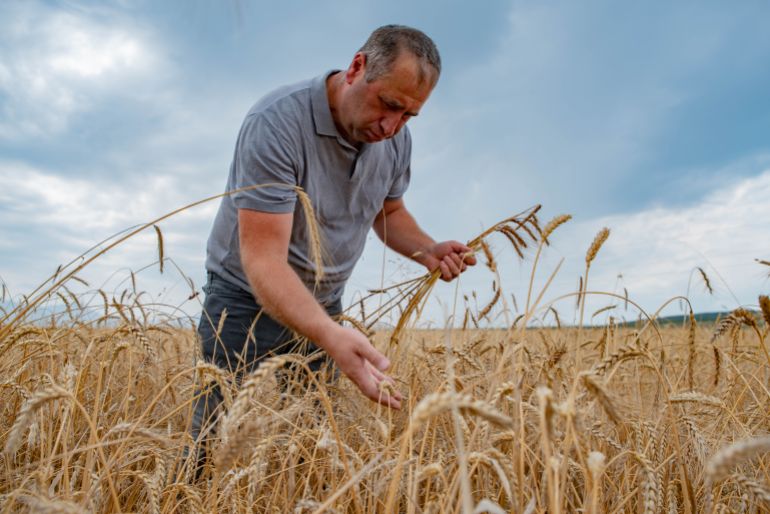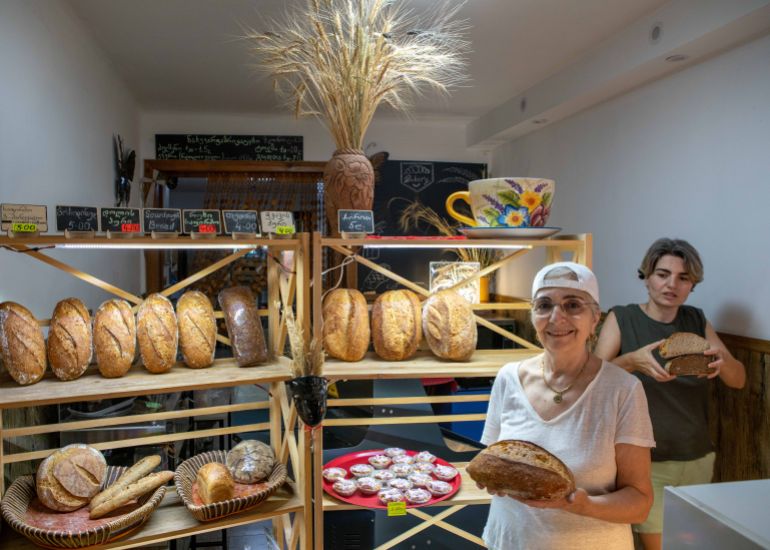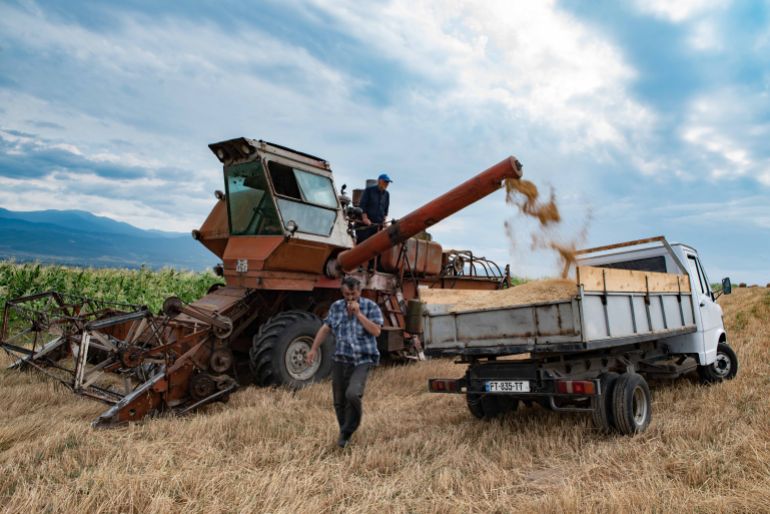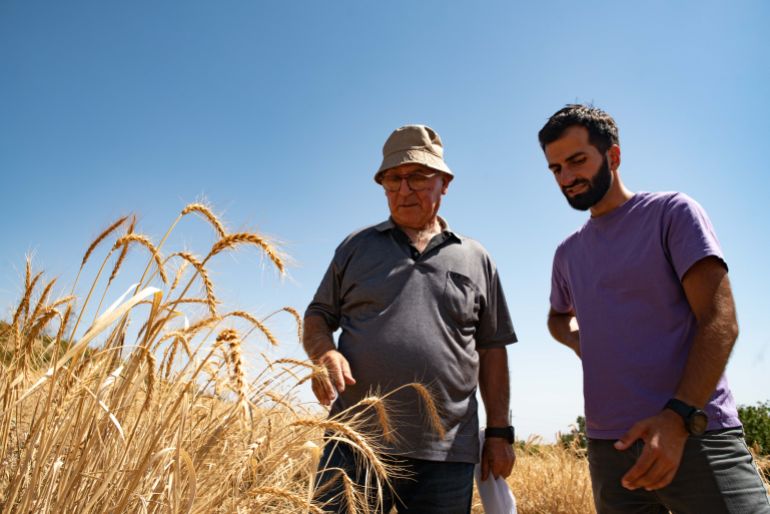Georgia relies on Russian wheat but as the Ukraine war drags on, local farmers are moving to strengthen the domestic market.
Anzor Maisuradze is a worried farmer.
As fears of a looming global food crisis dominated headlines in August, he struggled to harvest his wheat amid a shortage combine harvesters in Georgia and expensive fuel prices, which spiked after Russia launched a war on Ukraine.
“Our common enemy is just there,” he said, pointing north from his fields in the village of Nabakhtevi.
The Russian-controlled borders of the breakaway region of South Ossetia, which Georgians call Samachablo, lie fewer than 10km (6 miles) away.
Maisuradze is no typical farmer. His 48-hectare (119-acre) operation, one of the country’s first organic wheat farms, has helped revive local varieties of Georgian wheat that nearly disappeared during the Soviet era when farms were collectivised and intensive agriculture was prioritised under a centrally planned economy.
“We lost so much of our culture and identity during [the Soviet] period, not just our agricultural knowledge and seeds,” he said.
Today, Maisuradze grows four kinds of endemic wheat.
They grow higher, which means the heads of the plant tend to droop down to the ground when ripe, and they have long bristles at the seed tips. All of these characteristics make them more difficult to harvest and thresh.
“If it costs 200 gel ($70) to harvest one hectare of normal wheat, I have to pay 300 gel ($110),” Maisuradze said. “I don’t know how much it’ll cost me this year.”

Until the middle of the last century, 14 of 20 of the world’s ancient wheat species – five of which are endemic to Georgia – and hundreds of subspecies and locally bred varieties were widely cultivated across Georgia.
Driven to obscurity by Soviet agricultural policies, these endangered ancient wheat varieties are making a slow comeback in a country that has been chronically dependent on Russia for its wheat, despite having no diplomatic relationship with its powerful northern neighbour, with whom it went to war in 2008.
“Our country is partially occupied, and we’re dependent on Russian wheat. It’s ridiculous,” said Tamaz Dundua, programme manager at Elkana, a non-profit group that promotes organic agriculture and domestic varieties of plants and animal breeds among farmers.
Elkana’s free seed distribution programme, which began in 2009, helped bring tsiteli doli, an endemic grain, to Georgians.
Dundua believes the group’s efforts are as much about food sovereignty and bringing back Georgia’s rich agro-biodiversity as they are about offering homegrown, healthier alternatives to the industrial wheat that is mostly imported from Russia.
“It’s not only about food security. It’s about general security for sure,” says Eka Gigauri from Transparency International’s Tbilisi office. “Russians are not our friends, and they will do their best to make us dependent on them and punish us if we do something they don’t like.”

At the moment, though, 98 percent of Georgia’s wheat imports come from Russia, and Georgia’s government has refused to join international financial sanctions on Russia, citing “national interests.”
Gigauri fears that the heavy reliance on Russian wheat could weaken the national economy and cause damage akin to the impact of Moscow’s 2006 embargo on Georgian wine.
With the global grain squeeze, the price of bread, which on average constitutes more than 60 percent of the daily diet in Georgia, has risen by 36 percent.
The most popular bread is called tonis puri, a kind of flatbread baked on the walls of a partially buried mud tandoor oven.
“We’ve managed to still keep our prices for a tonis puri at 1.30 lari ($0.46) but most bakeries downtown have already increased their prices to 1.50 gel ($0.53),” said Nika Makharadze, a tone puri baker in suburban Tbilisi.
He said the lower price has increased traffic to his bakery, where he makes about 500 puris a day. In February just before the start of the Ukraine war, a tone puri here cost 1.10 gel ($0.39).
Stimulating domestic wheat production
The government is taking notice and has hinted at a large-scale programme to stimulate wheat production.
“We think it will be possible to increase wheat self-sufficiency in the country from 15 to 50 percent in a few years, and we will do it,” Otar Shamugia, the environment and agriculture minister, told parliament in April, adding the government would work on aid packages to help farmers meet rising fuel, fertiliser and pesticide prices.
But when contacted by Al Jazeera in September, the ministry said the government had yet to come up with a comprehensive plan.
Despite this, wheat production is on the rise in Georgia.
The global increase in wheat prices has encouraged young farmers like Beka Aslanishvili, who recently left his fintech industry job to manage his father’s farm.

Although he’s interested in endemic wheat varieties, he has decided to cultivate an Austrian winter wheat on 40 hectares (100 acres) of his land.
“I’m purely driven by economics,” he said. “I want to focus on productive varieties to ensure my profits for the first few years, but at the same time, I see the market for alternative grains is growing.”
Irakli Rekhviashvili, 78, is a respected agronomist and seed selection specialist who helped preserve indigenous seeds on his personal farm after testing and research stations closed in the wake of the Soviet collapse.
Rekhviashvili cultivates more than 90 varieties of wheat on his organic farm. He’s also the director of research at Lomtagora, one of Georgia’s biggest wheat seed suppliers.
Together with his partner Kakha Laskhi, Rekhviashvili helped breed an intensive wheat variety called Lomtagora 126, which has yielded 11 tonnes a hectare at the company’s test site.
Given that most indigenous seed varieties yield no more than two to three tonnes per hectare at best, he too believes modern intensive wheat varieties that yield four to six tonnes on average should be prioritised to improve Georgia’s self-sufficiency – despite the heavy agro-chemical inputs like fertilisers they require.
“Growing old varieties is a future business for those who are willing to pay the price of bio-products and appreciate high quality wheat,” he said.
Benefits of old varieties
Dundua, from the non-profit Elkana, fears that any large-scale state programme will push for intensive wheat cultivation and overlook the advantages of Georgia’s ancient heritage grains, known for their healthier gluten and higher protein content.
“We need the small farmers to maintain diversity,” he said.
Many of these ancient varieties have also been proven to be more resistant to pests, fungus, drought and even frost.
“What we see is [climate change] getting more and more problematic, so chelta zanduri, makha, dika, … these [local] types of wheat, they are very sustainable,” Dundua said. “They will never die even without any type of irrigation. If you don’t irrigate industrial wheats, they will die.”
Georgia’s market for heritage grain bread is limited to a handful of boutique bakeries catering to Tbilisi’s upmarket clientele.
But more affordable bakeries using native wheat are popping up.
Natela Khutsishvili opened her bakery two years ago in a blue-collar Tbilisi neighbourhood best known for construction materials and used car parts.
“Whoever tries this bread and likes it will never go back to eating white industrial bread,” Khutsishvili said.
Many of her regular customers sought her out because of diet restrictions due to diabetes or chronic skin conditions caused by gluten sensitivity.

Although her heritage grain bread costs twice as much as the puri made from industrial wheat, Khutsishvili said people need to eat less of it to feel satiated thanks to its dense texture, rich taste and higher nutritional content.
She also mixes white flour into some of her breads to make them more affordable.
AD
This also helps stretch her limited supply of heritage grain wheat flour.
“Even in my village, I tried to get farmers to grow local endemic varieties, but no one wants to risk it yet because of the low yields,” she said.
Seed certification debate
Dundua estimates that about 500 farmers across the country have started growing endemic wheat but most are small farmers with an average of 1.5 hectares (3.7 acres) of land.
He believes a lack of state support and a shortage of equipment put a niche market out of reach.
The Georgian government has also recently started implementing a 2017 law that tightens restrictions around the sale, distribution and production of seeds. It requires all seeds to undergo a complex and expensive certification process that includes genetic lab testing before being sold.
“We can’t squeeze farmers at this point,” Dundua said. “The only way to save these endangered varieties is for farmers to start growing them.”
He fears the extra costs and the highly variable and continuously evolving properties of old varieties of wheat will make it hard for them to meet modern certification standards. His organisation is campaigning for changes to the law for heritage seeds.
More advocates for Georgia’s endemic seeds are joining the fight.
In 2019, development worker Asmat Lali Meskhi started a campaign to register Georgian wheat with UNESCO as an intangible cultural heritage in need of urgent safeguarding.
The UN agency deferred the application and requested the nomination focus more on “Georgian wheat culture” rather than “the preservation and restoration of endemic wheat as a crop”, but Meskhi is confident a resubmission next year will prove successful.
If so, Meskhi hopes it could replicate the success of the 2013 nomination of Georgia’s method of making wine in clay pots. It helped spur natural winemaking and restore endemic grape varieties.
However, Meskhi is also supportive of the certification of seeds that agricultural workers like Dundua fear will hamper famers’ desire to grow indigenous wheat.
“Seed quality is very, very important when you are growing cereals or wheat, and if you don’t have certified seeds, how do you know that the seeds are of good quality?” asked Meskhi, who also supports a seed certification law she believes will safeguard endemic seeds and allow them to enter European markets.
Grassroots seed revival and sovereignty
But not everyone agrees.
According to Dundua from Elkana, tougher seeds laws will affect their ongoing free seed distribution programme and also curtail the grassroots work of farmers like Manoni Akhvlediani, who are helping propagate still rare endemic grains.
Three years ago, Akhvlediani turned a corner of her ancestral apple orchard into a field where she grows two types of wheat – chelta zanduri and gvatsa zanduri, which are related to einkorn and emmer, two of the world’s first domesticated varieties.
From a handful of seeds she received from researchers in 2019, she hopes she can revive their cultivation in Lechkhumi, her home region where these seeds are believed to have originated.
“Restoration, popularisation and preservation of zanduri is my main goal, first of all because it’s an endemic breed of our region Lechkhumi and this is a a matter of prestige for us,” she said.
Her dream is to bake bread from these native grains, once she can afford a de-hulling thresher for the species.

While the future of endemic grain revival is being debated, the Ukraine war and solidarity felt by many Georgians could win over more customers.
“This is also a kind of political protest for me,” said Levan Qoqiashvili, who with his wife, Lali Papashvily, recently launched a niche-dining business specialising in Georgia’s famous traditional bread and cheese dish called khachapuri.
The couple is well known as gastronomic consultants who have helped establish a few of Tbilisi’s best known fine-dining venues.
But their latest project, called Gunda, is a personal venture.
“The most important part of this experience is going to be the flour – flour made from endemic Georgian wheat,” said Lali.
The couple pre-ordered 10 tonnes of endemic wheat flour this year from local farmers. They plan to expand, and talks are under way with a potential partner in New York. Creating a customer base will encourage more farmers to grow endemic Georgian wheat, they said.
They have worked with ethnographers and gastronomic researchers to seek out more than 50 traditional khachapuri recipes across the country, many of which they hope to add to their menu. But for this to work, Levan said, geopolitical events matter.
“Russia is an occupier, and for our bread concept, peace is very important,” said Lali.
Back in Nabakhtevi, Misauradze, who was able to harvest his fields in late August, said he welcomes the growing support for the endemic wheat movement he helped pioneer.
Although he believes native wheat may never feed all Georgians, he said these ancient grains are vital to emphasise the country’s sovereignty.
“If we lose this heritage, what else are we left with? But for this to continue, we need proper [state] support.”
Source: Aljazeera


